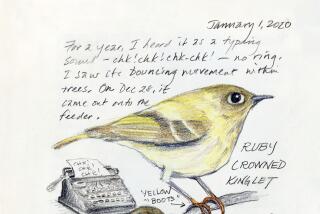An Essayistâs Search for Bedrock : AFRICAN CALLIOPE THE TUGMANâS PASSAGE RED WOLVES AND BLACK BEARS, <i> By Edward Hoagland (Lyons & Burford: $14.95, each)</i>
To read an essay by Edward Hoagland is to find oneself on an uncertain path, following the tracks and peregrinations of a mind so keen-nosed and acute, so yeasty, restless and digressive as to incite a kind of intellectual itch and emotional vertigo. Yet, after stumbling, falling and picking oneself up again, trotting after the scent left behind, an uncanny sense of balance radiates from his words--not from any strict structural logic, but from the constant meeting with truths.
Thereâs a fecund richness to each of his essays--no need for TV if you read Hoagland. He gives us high divers, tugboat captains, wolf and bear biologists, tree planters and lovers; dogs, owls, hummingbirds, snakes, newts and frogs; cranberries, butterflies, weeds and apple trees; courageous turtles, treating all and each with narrative verve and bonhomie.
Thoreau equated sauntering with a holy pilgrimâs progress. Hoagland is not searching for divinity but for bedrock. The narrative shape of his essays follows both the biological upheavals and the smooth, conversational saunterings of his mind.
It thrilled me to hear that two collections of essays and a memoir of a stay in war-torn Sudan would be republished. These are desert island books, works that can always be found on the shelf of a bookstore. I read âThe Courage of Turtles,â âRed Wolves and Black Bears,â and âAfrican Calliopeâ in the mid-70s and was so moved by his words that I thanked him in a letter for the gift of his books. I wondered if I might meet him one day. He wrote back within the week and said, yes by all means, stop by when I was in New York. And so I did.
We walked the streets of the Village with his dog on a leash, ate lunch, did errands and picked up his daughter, Molly, from school. At that time, Hoaglandâs stutter was so bad that it sometimes took minutes for a single word to come out. Inevitably, a bus would roar by at just that moment and, to my embarrassment, I would not hear him. We have been friends now for 17 years.
In his comment about writers: âTime is short. By covering his ears with his forearms he hears the roar of his own living body, and, by touching the hollows of his cheeks, foresees the feel of the dead skull,â Hoagland describes himself. When we went on a pack trip together during the 1988 Yellowstone Park fires, he was going blind. Despondent, he lay out on the trail where a few hours before weâd seen fresh grizzly tracks, apparently hoping to be eaten by a bear. Perhaps it was not so much that he wanted to die as to live in the presence of death. How else do we learn to live fully? His daughter and I conjectured that rubbing elbows with a silver-tipped grizzly would have been enough. For Hoagland, every rub of the elbow counts, whether itâs with a salamander or a red-haired beauty.
The key to anyoneâs humanity has to do with how large an accommodation can be made, how much can be let in. In Hoaglandâs work, the margins are wide. What prevails is an all-encompassing fecundity, the mewing and squalling of life coming into being, of licentiousness between men and women, of the nuts and bolts of the natural habitats around his summer cabin, far to the north, facing a wall of granite.
Thoreau said: âA lover of Nature is preeminently a lover of man. If I have no friend, what is nature to me?â Whatâs unusual about Hoagland, compared to many other contemporary essayists of his ilk, is that humans are never precluded from the scene. The âeco-eliteâ would keep the wildlife and have humans and their domestic animals done away with, except for themselves and their own mewling children, cats and dogs.
The essay entitled, âThe Tugmanâs Passageâ is so full of affectionate and fascinating detail about a tugboat captain and his crew that I wanted the piece to go on endlessly, unreeling whole lives and work on the water.
Fragile, aloof, boyish as Hoagland is in person, heâs content to exist--as a curious visitor at least--in the middle of the fray, whatever it is at the moment. Dogs, bears, turtles, grandchildren, biologists, crab apple trees, horses and hummingbirds are all given the courtesy of Hoaglandâs generous scrutiny. Fearlessly, he includes himself in these verbal broths, serving up his own life with an astounding forthrightness and honesty. My favorite of these is âThe Ridge Slope Fox and the Knife Thrower.â
He writes: âOf course my own âsnowfallâ at the moment is this upsurge of loneliness, in which a failure is implied: failure, to begin with, because one must dodge off to a solitary refuge. We like to blame the need for second homes on society, saying that our cities are unlivable, but the failure is personal, first of all. Alone at last, with the trees bulging above us in shapes that have defined and preserved the world, we find that weâre incapacitated for living alone also.â
There are wild streaks in everything and everyone and Hoaglandâs the man to track them down.
Nowhere else have personal vicissitudes and quandaries been used to elucidate truths in such a raw, quirky and humorous manner. Thatâs what happens when Hoagland get close to the flame: Gallows humor erupts as the hair on his eyelids gets singed. His own life has not been easy, nor is he one for whom easiness would ever come naturally. He developed a ferocious stutter at age 10, and, in his mid-50s, began losing his eyesight. After seeing many doctors (who all told him that his condition was inoperable), he found a young woman eye surgeon who bravely said she could try a new procedure on him. After all, what did he have to lose? He was already nearly blind.
The operation succeeded. With his plastic implants, Hoagland can see better than he ever could. And as soon as he could see, his lifelong stutter nearly faded away. Now, along with the bird songs he readily identifies, he can see and say the names of the birds he so loves.
Hoagland writes: âAs Renaissance men of a new kind, we should feast our eyes. Instead, we fret about civilization. Civilization is with us to stay. I worry more about the toadâs and tree frogâs songs. I want that stew to be yeasty with tadpole, muskrat and otter bones, loon bills, ladyâs-slippers, skunk cabbage, jack-in-the-pulpits, and moose and bear pies, not just an ossuary of human relics. Otherwise my moss is not going to survive.â
More than a Renaissance man, Hoagland practices a kind of holism in which the whole--the essay--is more than the sum of its parts. Though his essayist walkabouts often go in the direction of raw loneliness, human failing and numbing personal loss, an immense vitality always breaks through, a passion for life. On a visit to his house in Vermont, bouts of typing (no computer for this Renaissance man), alternated with garden walks and the identification of birds by their song. Later he dandled his friendâs grandchild on one knee while his pet snake--a python rescued from one of his students--slithered across the other leg. Wherever Hoagland lives there are always rescued turtles, rescued birds, rescued dogs, rescued snakes--heartbreaking reminders of the daily demise of life on earth.
In the new afterword to âThe Tugmanâs Passage,â Hoagland asks: âWhat do you do when youâre 61 and havenât rehearsed for it?â Yet he knows well that there are no rehearsals in life, there is only unconditional living. About the process of writing, he says, âItâs from his passion not his experience, that a writer primarily writes. His passion is what is fragile too; that by and by itâs going to run out.â
But his hasnât. Despite our conversations about growing old, about death and resurrection, Hoaglandâs habit of attention--his passion for life--keeps his work fresh and true. After years of reading and rereading my friend, I have come to understand that there is no straight line and no path that is narrow. The world he gives us is a rushing mountain stream laden with flotsam and jetsam--all kinds of fascinating arcana, hard facts and wise trajectories; it is a stream that changes courses in storms, moves boulders, cuts banks so the roots of things show. Thatâs the kind of wild course on which his prose pushes us, and what a keen and compassionate push it is. Iâve said it privately to Hoagland, and now I say it publicly: Thank you.
More to Read
Sign up for our Book Club newsletter
Get the latest news, events and more from the Los Angeles Times Book Club, and help us get L.A. reading and talking.
You may occasionally receive promotional content from the Los Angeles Times.







